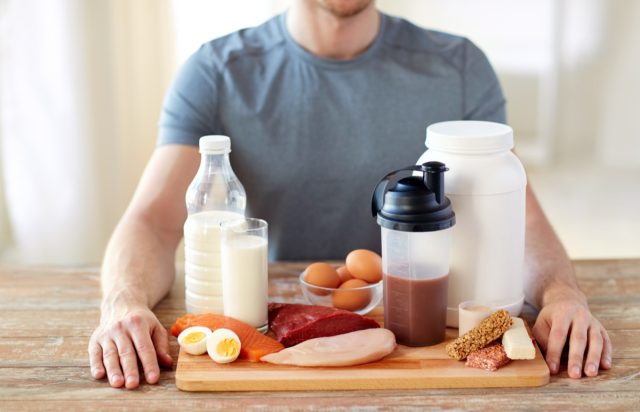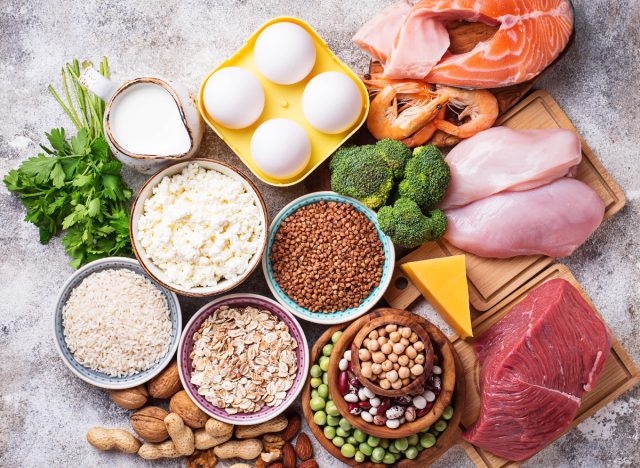How Much Protein Do You Need To Eat Every Day?

One nutrient that continues to steal the spotlight from its fellow macronutrient counterparts is protein. There's no denying that protein has a lot going for it. Eating protein can squash hunger pangs, fire up your metabolism, and help build up muscle. But with all this praise, it's easy to wonder: can we have too much of a good thing?
To get expert insights, we spoke to registered dietitian nutritionist Bonnie Taub-Dix, RDN, host of the Media Savvy Podcast and creator of BetterThanDieting.com. She says, "Even though many of us eat more protein than we need, headlines [always encourage] us to want more."
So, how much protein do we really need to eat each day? In this article, we discuss protein: its benefits, the daily recommended amount, and the not-so-tasty consequences of skipping or overconsuming it.
What is Protein & What Are its Health Benefits?

Protein is a vital macronutrient composed of amino acids, which are the building blocks for various bodily functions. Found in every cell, tissue, and organ in our body, protein provides structure, facilitates communications between cells, transports molecules, and builds new cells. It's present in our hair, skin, brain, liver, tendons—you name it!
Protein offers many health benefits, including promoting satiety, reducing sugar cravings, aiding in muscle repair and growth, and boosting metabolism. It supports the immune system, helps maintain muscle mass, and is essential for healthy skin, hair, and nails.
As one of the three macronutrients our bodies need for energy, protein is unique in that our bodies do not store a reserve of it as they do with carbohydrates and fat. Therefore, we must ensure we consume enough protein through our diets to meet our body's needs. But how much do we need?
Recommended Daily Protein Intake
While the USDA reports that most Americans are meeting their protein needs, there is an optimal range that individuals should aim for to ensure they are getting the most benefit from this essential nutrient. The Dietary Guidelines for Americans recommend the following daily protein intake:
- Adult women: About 46 grams of protein per day
- Adult men: Around 56 grams of protein per day
However, these recommendations can vary significantly depending on various factors such as age, gender, activity level, and overall health status. According to Taub-Dix, certain groups often require higher amounts of protein:
- Pregnant women: Need additional protein to support fetal growth
- Older adults: May need more protein to prevent muscle loss
- Athletes: Require increased protein to repair and build muscle tissues
Tailoring protein intake to individual needs can help optimize health and physical performance, ensuring that everyone gets the right amount for their specific situation.
Protein Requirements for Different Lifestyles

One of the biggest factors affecting protein needs is activity level. If you love busting out weight reps at the gym most days of the week, you likely need more protein compared to someone who is more sedentary.
Sedentary Individuals:
- Protein recommendation: Around 0.8 grams of protein per kilogram of body weight per day
- Example: For a 150-pound sedentary person, this translates to about 54 grams of protein per day
Highly Active Individuals:
- Protein recommendation: About 1.2 to 2.0 grams of protein per kilogram of body weight per day
- Example: For a 150-pound active person, this translates to 82 to 136 grams of protein per day
Individuals Looking to Lose Weight:
- Minimum protein intake: At least 0.36 grams of protein per pound of body weight
- Moderate protein intake: 0.6 to 0.8 grams of protein per pound of body weight
- Higher protein intake: 0.8 to 1.2 grams of protein per pound of body weight, particularly beneficial for
Side Effects of Inadequate Protein Consumption
If you ever feel unsatisfied after eating a meal, plagued by sugar cravings, or constantly low on energy, not getting enough protein might be the culprit. Taub explains that inadequate protein intake can lead to several health issues:
- Muscle loss
- Depressed immune system
- Hormonal imbalances
- Brittle nails
- Hair loss
- Skin issues
Inadequate protein may also lead to poor mood, trouble focusing, and undesired weight fluctuations. If you are hitting the recommended protein number but still suspect you might be falling short, consulting with a registered dietitian nutritionist can be a great next step.
Potential Risks of Excessive Protein Consumption
On the other hand, people who gulp down mega amounts of protein to gain muscle won't make gains any faster. In fact, overconsuming protein may derail your health and fitness efforts and can lead to serious health concerns. Taub-Dix explains, "Consuming an excessive amount of protein could lead to stress on your kidneys and cause digestive issues."
Overdoing it on protein can also lead to insufficient fiber intake. Eating enough fiber promotes a healthy gut and digestion. In addition, high-protein diets require increased water intake. Therefore, if you're not consuming enough fiber and/or fluids, you may be setting your digestive system up for a major backup.
Taub-Dix says, "What many people don't realize is that the regular overconsumption of protein can cause you to gain weight, plus if the protein you're eating includes lots of foods high in saturated fat, you could be increasing risks of heart disease as well." Therefore, choosing the right amount and type of protein is crucial, which we'll discuss next.
Sources of High-Quality Protein

The good (and delicious) news is there's a wide selection of high-quality protein foods to choose from. Here's a breakdown:
- Fish: Seafoods like salmon, tuna, cod, and tilapia are delicious and nutritious choices.
- Animal meats: Eggs, chicken, and turkey are also lean and high-quality protein choices.
- Dairy products: Non-fat or low-fat Greek yogurt, cottage cheese, cheese, or milk are good protein sources.
- Plant sources: Beans, lentils, nuts, and seeds like almonds, pistachios, and hemp seeds are also rich in protein. Soy products like tofu, edamame, and soymilk are also excellent plant-based protein sources.
Protein is vital to our health and provides a wealth of benefits to our bodies. Remember to aim for enough each day, but don't overdo it.









